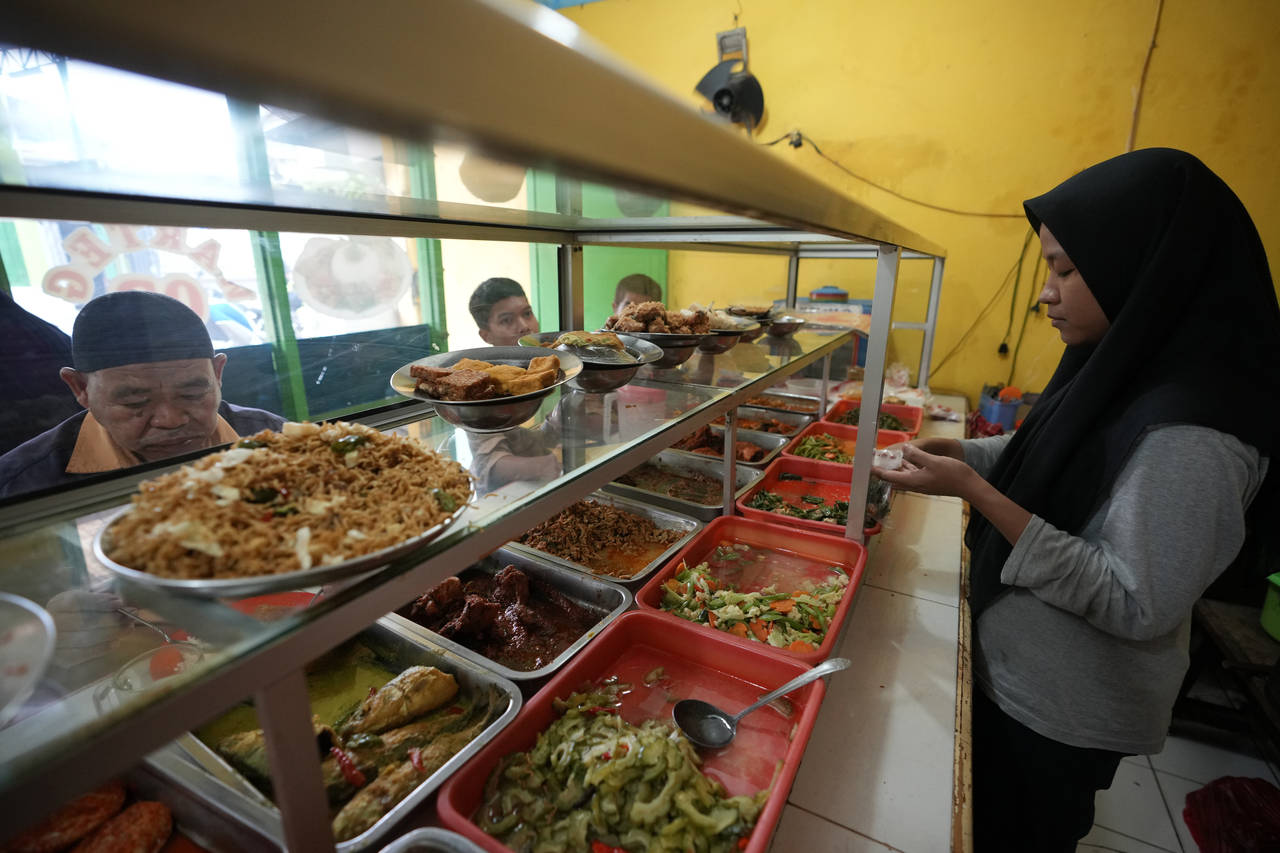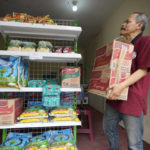War in Ukraine at 1 year: Pain, resilience in global economy
Feb 14, 2023, 9:22 AM | Updated: Feb 15, 2023, 6:35 am

A worker serves customers at a food stall in Bekasi, on the outskirts of Jakarta, Indonesia, Thursday, Feb 2, 2023. Nearly a year after Russia invaded Ukraine, punishingly high food prices are inflicting particular hardship on the world’s poor. In Jakarta, vendors know they can’t pass along surging food prices to their already struggling customers. (AP Photo/Achmad Ibrahim)
(AP Photo/Achmad Ibrahim)
An Egyptian widow is struggling to afford meat and eggs for her five children. An exasperated German laundry owner watches as his energy bill jumps fivefold. Nigerian bakeries have shut their doors, unable to afford the exorbitant price of flour.
One year after Russia invaded Ukraine on Feb. 24, 2022, and caused widespread suffering, the global economy is still enduring the consequences — crunched supplies of grain, fertilizer and energy along with more inflation and economic uncertainty in a world that was already contending with too much of both.
As dismal as the war’s impact has been, there’s one consolation: It could have been worse. Companies and countries in the developed world have proved surprisingly resilient, so far avoiding the worst-case scenario of painful recession.
But in emerging economies, the pain has been more intense.
In Egypt, where nearly a third of the population lives in poverty, Halima Rabie has struggled for years to feed her five school-age children. Now, the 47-year-old widow has cut back on even the most basic groceries as prices keep rising.
“It’s become unbearable,” Rabie said, heading to her job as a cleaner at a state-run hospital in Cairo’s twin city of Giza. “Meat and eggs have become a luxury.”
In the United States and other wealthy countries, a painful surge in consumer prices, fueled in part by the war’s effect on oil prices, has steadily eased. It’s buoyed hopes that U.S. Federal Reserve inflation fighters will relent on interest rate increases that have threatened to tip the world’s biggest economy into recession and sent other currencies tumbling against the dollar.
China also dropped draconian zero-COVID lockdowns late last year that hobbled growth in the second-largest economy.
Some good fortune has helped, too: A warmer-than-usual winter has helped lower natural gas prices and limit the damage from an energy crisis after Russia largely cut off gas to Europe. Still, oil and gas prices were high enough to cushion the impact on the energy-exporting Russian economy from the international sanctions imposed after President Vladimir Putin’s invasion.
The war “is a human catastrophe,” said Adam Posen, president of the Peterson Institute for International Economics. “But its impact on the world economy is a passing shock.”
Still, in ways big and small, the war is causing pain. In Europe, for example, natural gas prices are still three times what they were before Russia started massing troops on Ukraine’s border.
Sven Paar, who runs a commercial laundry in Walduern, southwest Germany, is facing a gas bill this year of about 165,000 euros ($176,000) — up from 30,000 euros ($32,000) last year — to run 12 heavy-duty machines that can wash 8 tons of laundry a day.
“We have passed the prices on, one to one, to our customers,” Paar said.
So far, he has been able to keep his customers after showing them the energy bills that accompany the price increases.
“Fingers crossed, it’s working so far,” he said. “At the same time, the customers groan, and they have to pass the costs on to their own customers.”
While he’s kept his steady customers, they’re offering less business. Restaurants with fewer customers need fewer tablecloths washed. Several hotels closed in February rather than pay heating costs during their slow season, meaning fewer hotel sheets to clean.
Punishingly high food prices are inflicting particular hardship on the poor. The war has disrupted wheat, barley and cooking oil from Ukraine and Russia, major global suppliers for Africa, the Middle East and parts of Asia where many struggle with food insecurity. Russia also was the top supplier of fertilizer.
While a U.N.-brokered deal has allowed some food shipments from the Black Sea region, it’s up for renewal next month.
In Egypt, the world’s No. 1 wheat importer, Rabie took a second job at a private clinic in July but still struggles to keep up with rising prices. She earns less than $170 a month.
Rabie said she cooks meat once a month and has resorted to cheaper byproducts to ensure her children get protein. But even those are becoming harder to find.
The government urged Egyptians to try chicken feet and wings as an alternative source of protein — a suggestion met with scorn on social media but that also led to a spike in demand.
“Even the feet have become expensive,” Rabie said.
In Nigeria, a top importer of Russian wheat, average food prices skyrocketed 37% last year. Bread prices have doubled in some places amid wheat shortages.
“People have huge decisions to make,” said Alexander Verhes, who runs Life Flour Mill Limited in the southern Delta state. “What food do they buy? Do they spend it on food? Schooling? Medication?”
At least 40% of bakeries in the Nigerian capital of Abuja shut down after the price of flour jumped about 200%.
“The ones still in the business are doing so at breaking point with no profits,” said Mansur Umar, chairman of the bakers’ association. “A lot of people have stopped eating bread. They have gone for alternatives because of the cost.”
In Spain, the government is spending 300 million euros ($320 million) to help farmers acquire fertilizer, the price of which has doubled since the war in Ukraine.
“Fertilizer is vital because the land needs food,” said Jose Sanchez, a farmer in the village of Anchuelo, east of Madrid. “If the land does not have food, then the crops do not grow up.”
It all means a slowing global economy. The International Monetary Fund dropped growth expectations this year and in 2022 that equates to about $1 trillion in lost production. Europe’s economy, for example, “is still experiencing significant headwinds” despite a drop in energy prices and is at risk of falling into recessio n, said Nathan Sheets, global chief economist at banking giant Citi.
The IMF says consumer prices jumped 7.3% in the wealthiest countries last year — above its January 2022 forecast of 3.9% — and 9.9% in poorer ones, up from 5.9% expected pre-invasion.
In the U.S., such inflation has forced businesses to be nimble.
Stacy Elmore, co-founder of The Luxury Pergola in Noblesville, Indiana, said the cost of providing health insurance for eight workers has spiked 39% over the past year — to $10,000 a month. Amid a labor shortage, she also had to raise hourly wages for her top installer from $24 to $30 an hour.
Inflation-whipped consumers began to balk at paying $22,500 for a 10-by-16-foot louvered pergola — kind of a gazebo without walls — that was sold through dealers. Sales sank last year. So Elmore pivoted to do-it-yourself models, selling directly to shoppers at a sharply reduced price of $12,580.
“With inflation so high, we’ve worked to broaden the appeal of our products and make them easier for the average person to acquire,” Elmore said.
In the Indonesian capital, Jakarta, many street vendors know they can’t pass along surging food prices to their already struggling customers. So some are skimping on portions instead, a practice known as “shrinkflation.”
“One kilogram of rice was for eight portions … but now we made it 10 portions,” said Mukroni, 52, who runs a food stall and like many Indonesians goes by only one name. Customers, he said, “will not come to the shop” if prices are too high.
“We hope for peace,” he said, “because, after all, no one will win or lose, because everyone will be a victim.”
___
Wiseman reported from Washington and McHugh from Frankfurt, Germany. AP journalists Samy Magdy in Cairo; Chinedu Asadu in Abuja, Nigeria; Anne D’Innocenzio in New York; Iain Sullivan in Anchuelo, Spain; and Edna Tarigan in Jakarta, Indonesia, contributed.
Copyright © The Associated Press. All rights reserved. This material may not be published, broadcast, rewritten or redistributed.




















